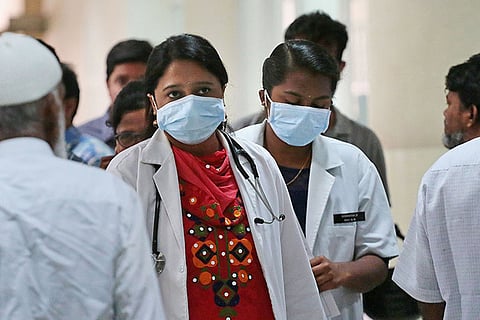

With the number of daily coronavirus cases in India breaching the 27,000 mark, several states and districts are implementing partial weekend lockdowns. But do people think these lockdowns are helping in controlling COVID-19? A recent survey of 16,000 people from 201 districts in India found that only 28% respondents said such lockdowns are useful. 24% felt the impact of the lockdown in curbing COVID-19 was minor, while 44% said such lockdowns were meaningless and had no impact. 4% did not have an opinion.
This means that 68% of the citizens surveyed believe weekend lockdowns have negligible or minor impact on containing spread of COVID-19. The survey was done by LocalCirlces, a community and social media platform, to get citizen perspective on what they feel about weekend lockdowns and if there could be a better way to implement new lockdowns.
In the earlier LocalCircles polls done in the last three weeks, 66%-74% citizens said that there should be a complete lockdown in the 15 high viral load districts of India.
As per a report by the Ministry of Health and Family Welfare (MoHFW) last week, 49 districts now contribute to 80% of India's COVID-19 case load. When citizens were asked how these 49 districts should be managed to contain COVID-19, 46% said a complete lockdown should be implemented for three weeks or more (home delivery of essentials and all activities closed), while 23% said a lockdown should be implemented like it was done between March 25-May 3. Only 9% said weekend lockdowns should be implemented for the next three months, while 13% felt no action was needed and that the government should just continue with Unlock 2.0. Another 8% said normal functioning should be resumed and we should learn to live with the virus.
This implies that 69% citizens feel a stringent lockdown in 49 districts which have 80% of India’s case load is needed to contain the spread of COVID-19.
Chennai, for instance, had implemented a complete lockdown from June 19 – July 5. The number of cases in the city reduced by almost 50% - from the 2400-2500 per day range in the third week of June, to 1200 in the second week of July, LocalCircles says. In the Chennai lockdown, essential services were functioning. According to some LocalCircles members in Chennai, the positive impact of the lockdown in curbing the disease would have been even higher had Chennai shut shops for essential services and operated a home delivery model for essentials.
While many businesses are opposed to the idea of a lockdown, citizens are clear that it is critical in breaking the chain of COVID-19 spread. According to LocalCircles, some businesses stated that instead of functioning at 20%-30% volume because of lower footfalls, it is better to shut things for a 3-4 week period and restart activity at a higher scale when people are not as fearful to step out. LocalCircles did not specify the names of the businesses.
It should be noted however, that lockdowns are not a long-term solution to combating COVID-19 as they can only slow the spread of the virus to an extent and give the healthcare system time to breathe and prepare, experts have pointed out. Moreover, digital reach and digital literacy are also issues that need to be considered during a lockdown – not everyone can access essential services online.
Given that India has seen a 600% rise in the number of new coronavirus patients reported on a daily basis - from 4,000 during the second week of May and end of lockdown 3.0 to approximately 28,000 during the second week of July - status quo is clearly not an option, LocalCircles says. This is why people continue to believe that unless the spread of COVID-19 is contained in these high load districts, India will soon surpass the United States in terms of daily cases and become the most impacted country in the world from COVID-19.
LocalCircles says it will share these findings with senior leaders in the Central and state governments so that due consideration can be given to the public opinion and recommendations.
A total of 65% of the 16,000 respondents were men, while 35% respondents were women. While 54% respondents were from tier 1, 24% were from tier 2 and 22% respondents from tier 3, 4 and rural districts.